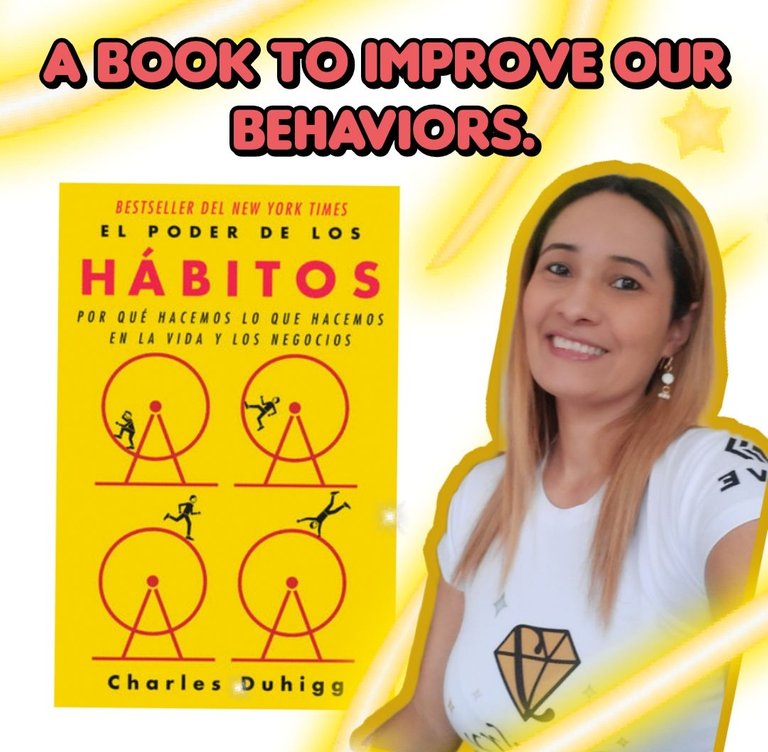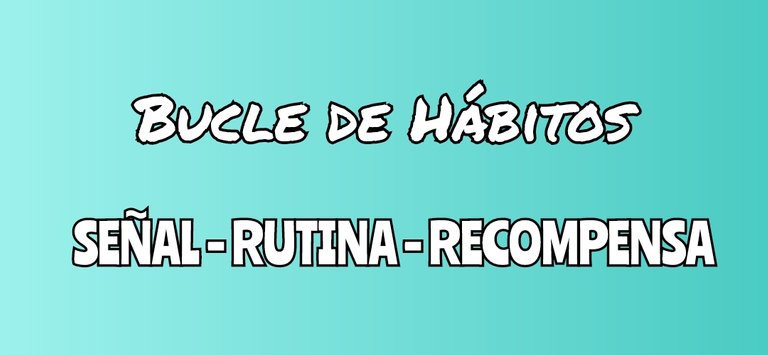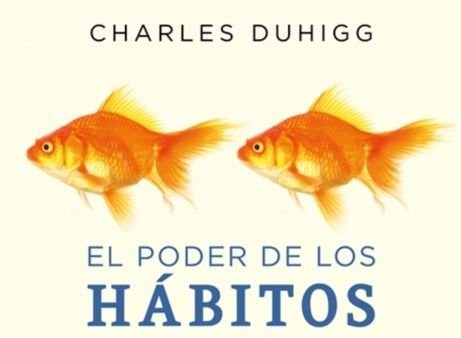


Un gran saludo mis queridos Hivers!!!!
Hace días quería escribir sobre este maravilloso libro que pude leer gracias a la invitación del amigo @irvinc a su programa de encuentros de bienestar, el club de lectura, quien amablemente me dijo si quería participar y claro que me animé a leer un buen libro, este libro llamado El Poder de los Hábitos escrito por Charles Duhigg es un libro el cual está basado en muchas historias reales para poder tener una mayor comprensión de los hábitos y cómo podemos formarlos en nuestra vida diaria.
Cada historia es diferente pero todos en sí tienen mucho que ver en los hábitos, y para comenzar podemos definir un hábito en algo que hacemos constantemente hasta inconscientemente podemos hacerlo pues es algo que Repetimos a diario.
Los hábitos no se pueden borrar pero podemos programar nuestro cerebro para poder crear nuevos hábitos que poco a poco pueden ir reemplazando otros.

A big hello my dear Hivers!!!!
Days ago I wanted to write about this wonderful book that I could read thanks to the invitation of my friend @irvinc to his wellness meeting program, the book club, who kindly told me if I wanted to participate and of course I was encouraged to read a good book, this book called The Power of Habits written by Charles Duhigg is a book which is based on many true stories to have a better understanding of habits and how we can form them in our daily lives.
Each story is different but all of them have a lot to do with habits, and to begin with we can define a habit in something we do constantly even unconsciously we can do it because it is something we repeat daily.
Habits cannot be erased but we can program our brain to be able to create new habits that little by little can replace others.

Al comenzar la lectura entre los primeros capítulos se habla de un experimento que hicieron con unas ratas que tenían lesiones en el cerebro, el experimento consistía en poner en un tipo laberinto en forma de (T) al final de uno de los extremos un chocolate, la rata al entrar al laberinto oscuro sería influenciada por el olor, sin embargo los primeros días las ratas se daban golpes por todo el laberinto hasta llegar a la recompensa, conforme pasaban los días llegaban directo pues ya sabían el camino y se aprendían la ruta.
Igualmente en otro experimento había un mono en una silla que tenía que apretar una serie de botones cada botón era para algo, había un botón en especifico que al presionarlo le caían al mono unas gotas de zarzamora lo cual era la recompensa al cabo de los días el mono aprendía cual era el botón que le daba su recompensa y ya iba directamente a presionarlo.
Entonces estos experimentos sirvieron para explicar el bucle de los hábitos el cual consiste en lo siguiente:
Señal - Rutina - Recompensa
At the beginning of the reading between the first chapters it talks about an experiment they did with some rats that had lesions in the brain, the experiment consisted of putting a chocolate in a kind of maze in the form of (T) at the end of one of the ends, the rat to enter the dark maze would be influenced by the smell, however the first days the rats were given blows throughout the maze to reach the reward, as the days passed they arrived directly because they already knew the way and learned the route.
Likewise in another experiment there was a monkey in a chair that had to press a series of buttons, each button was for something, there was a specific button that when pressed the monkey got a few drops of blackberry which was the reward after the days the monkey learned which was the button that gave him his reward and went directly to press it.
So these experiments served to explain the habit loop which consists of the following:
Signal - Routine - Reward


Señal: El detonante que dice que hábito hay que usar.
Rutina: Puede ser física, mental o emocional.
Recompensa: ayuda a recordar este bucle en el futuro.
Sabiendo este bucle podemos crear nuevos hábitos, como dije antes no podemos borrar un hábito pero si reemplazarlo, y esto es lo que podemos hacer con los viejos hábitos que no son tan buenos en nuestra vida, la recompensa no tiene que ser un regalo como tal, puede ser también la satisfacción de haber logrado algo.
El libro nos enseña que el mismo no sabe distinguir entre los hábitos buenos y malos, lo importante es que no le demos espacio a los malos hábitos de emerger nuevamente porque pueden surgir en cualquier momento.
Muchas veces existen hábitos que se hospedan sin que los notemos, como por ejemplo el comer comida callejera, se comienza por ejemplo 1 vez al mes, luego 1 cada vez cada semana, luego todos los fines de semana y hasta tres veces en la misma semana, algo que se no se puede frenar, se ha vuelto un hábito.
Signal: The trigger that tells which habit to use.
Routine: Can be physical, mental or emotional.
Reward: Helps to remember this loop in the future.
Knowing this loop we can create new habits, as I said before we can not erase a habit but replace it, and this is what we can do with old habits that are not so good in our life, the reward does not have to be a gift as such, it can also be the satisfaction of having achieved something.
The book teaches us that it does not know how to distinguish between good and bad habits, the important thing is that we do not give space to bad habits to emerge again because they can emerge at any time.
Many times there are habits that lodge without us noticing them, such as eating street food, for example, it starts for example once a month, then once a week, then every weekend and up to three times in the same week, something that cannot be stopped, it has become a habit.


Algo que me pareció muy interesante es que en el libro explica que la fuerza de voluntad bo es una habilidad, es solo un músculo y se cansa cuando se esfuerza, de modo que le queda menos energía para hacer otras cosas.
Un ejemplo del libro es el esposo que trabaja todo el día, el músculo está cansado y agotado, así que cuando llega a casa llega cansado y sin gana de hacer algunas cosas.
Hubo un ejemplo de unos estudiantes al grupo A los colocaron en un cuarto y le dieron golosinas los trataron bien y solo les dijeron que no comieran unas galletas de chocolate que estaban en la mesa, eso por un tiempo estipulado, ellos lo cumplieron.
El grupo B, los trataron mal, no les dieron golosinas y les pusieron las mismas galletas y les dijeron que no las comieran por un tiempo estimado, estos al irse la persona estaban molestos, llegaron a su punto de inflexión y se comieron las galletas, pues su fuerza de voluntad se agotó.
Something that I found very interesting is that in the book he explains that willpower bo is a skill, it is just a muscle and it gets tired when you exert yourself, so you have less energy left to do other things.
An example from the book is the husband who works all day, the muscle is tired and exhausted, so when he comes home he comes home tired and unwilling to do some things.
There was an example of some students, group A was put in a room and given treats, they were treated well and were only told not to eat some chocolate cookies that were on the table, that was for a stipulated time, they complied.
Group B, they were treated badly, they were not given treats and they were given the same cookies and were told not to eat them for an estimated time, when the person left they were upset, they reached their breaking point and ate the cookies, because their willpower was exhausted.

Otra de las cosas importantes es que los hábitos son más fácil de crearlos cuando se hacen en grupo, un ejemplo de ello son los alcohólicos anónimos y por mi parte creo que el hacer ejercicios en grupo por ejemplo a mi me funciona.
El autor del libro hablaba de que el quería dejar de comer galletas, y que siempre a las tres de las tarde le daban las ansias de ir a la panadería cerca del trabajo, el ya había detallado la hora en que le atacaban las ansias y luego el debía definir porque quería comer dulce, en realidad el se dio cuenta que el lo que quería era salir y charlar con personas aunque sea 10 a 15 minutos, así que programo si hora, cuando eran las tres de la tarde se levantaba e iba hablar con alguien de la oficina y así volvía a su oficina sin ansias de comer galleta, el explica que hay ver cuando esos patrones ocurren anitarque es lo que hacemos, hacer la secuencia y definir porque creamos esos hábitos, para luego poder reemplazarlos por otros.
Another important thing is that habits are easier to create when they are done in a group, an example of this is Alcoholics Anonymous and for my part I believe that doing group exercises for example works for me.
The author of the book talked about how he wanted to stop eating cookies, and that always at three o'clock in the afternoon he had the cravings to go to the bakery near work, he had already detailed the time when the cravings attacked him and then he had to define why he wanted to eat sweet, in reality he realized that what he wanted was to go out and chat with people even if it was 10 to 15 minutes, so he programmed the time, when it was three o'clock in the afternoon he would get up and go talk to someone in the office and then he would go back to his office without cravings to eat cookies, he explains that we have to see when those patterns occur and analyze what we do, make the sequence and define why we created those habits, so we can then replace them with others.
Realmente este libro es muy bueno con historias que ayudan a comprender los hábitos, y cómo podemos hacer para adoptar un mejor estilo de vida que viene luego de crear algunos buenos hábitos.
Gracias por leer y pasar por mi post, que si no han leído el libro aún puedan hacerlo, saludos.
Really this book is very good with stories that help to understand habits, and how we can do to adopt a better lifestyle that comes after creating some good habits.
Thanks for reading and stopping by my post, that if you haven't read the book yet you can do so, cheers.
Fotos principal editada con Canva.
Fotos de mi Autoría derechos reservados
Separadores Link
Cámara: Samsung M31
Banner por @danielvehe
Traducido con www.DeepL.com/Translator (versión gratuita)
Photos edited with Canva
Photos by me Author's rights reserved
Banner by @danelvehe
Separators Link
Camera: Samsung M31
Translated with www.DeepL.com/Translator (free version)




The rewards earned on this comment will go directly to the people( @yolimarag ) sharing the post on Twitter as long as they are registered with @poshtoken. Sign up at https://hiveposh.com.
I read this book also. It disturbed me to find out how much of our daily routine is habitual. I think I should read it again and follow better the instructions to rid myself of my worst habits.
Slados, if a lot of our daily routine are habits, read it again, I really liked it.
Your content has been voted as a part of Encouragement program. Keep up the good work!
Use Ecency daily to boost your growth on platform!
Support Ecency
Vote for new Proposal
Delegate HP and earn more
Esta frase me llamó mucho la atención y la considero totalmente cierta "La fuerza de voluntad no es una habilidad, es solo un músculo y se cansa cuando se esfuerza" Muchas veces la fuerza de voluntad se desgasta tanto que cada vez es hasta menos frecuente, sin embargo los buenos hábitos pueden ayudarnos a organizar nuestro estilo de vida y a obtener mejores resultados. Muy buena reseña.
Si realmente es así amiga, con los buenos hábitos podemos hacer que nuestra fuerza de voluntad descanse y hacer las cosas en positivo. Saludos